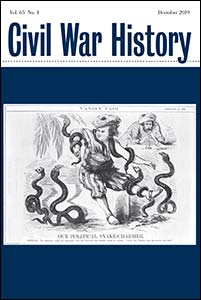December 2019, Volume 65, No. 4
Aug 13th, 2019STATE OF THE FIELD SERIES
The Politics of Continuity and Change in the Long Civil War Era
Rachel A. Shelden
This article examines the state of Civil War-era political history, arguing that the field is as vibrant as ever, producing wide-ranging and methodologically fresh interpretations of various aspects of the period. In particular, some of the best new work investigates new questions about the contours of slavery, freedom, and citizenship; the role of the State; and military, transnational, and economic policy concerns. At the same time, most of this work tends to explore either pre- or post-war problems rather than the full sweep of the era. In part, we have been trapped by old historiographical divides that center on revisionism. Given this context, political historians now have a clear opportunity to think more broadly about the period, to break free of labels, and to produce important insights into the dual role of continuity and change in the long Civil War era.
City of Refuge: Child Refugees and Soldiers’ Orphans in Civil War St. Louis
William McGovern
William McGovern explores the efforts of voluntary organizations and the Union army to mitigate the hardships faced by displaced and orphaned children from throughout Missouri and the Mississippi Valley. During the Civil War, St. Louis served as a magnet for both white and black refugees, and children constituted a significant portion of the overall displaced population. Believing refugees and orphans to be especially vulnerable, city charities, aid organizations, and the army provided care and assistance, but racism and sectional animosity often fueled suspicion of many migrant children. Philanthropic and military leaders, as McGovern maintains, argued that the orphaned children of fallen Union soldiers deserved special attention.
Edward L. Ayers is Tucker-Boatwright Professor of the Humanities and president emeritus at the University of Richmond. He has been a finalist for the National Book Award and the Pulitzer Prize, and won the Bancroft Prize for distinguished writing in American history. His newest book, The Thin Light of Freedom: The Civil War and Emancipation in the Heart of America (W.W. Norton & Co., 2017), received the Lincoln Prize.
Daniel W. Crofts is professor of history at The College of New Jersey. He is the author of numerous books, including Reluctant Confederates: Upper South Unionists in the Secession Crisis (University of North Carolina Press, 1993) and Lincoln and the Politics of Slavery: The Other Thirteenth Amendment and the Struggle to Save the Union (University of North Carolina Press, 2016).
Gregory P. Downs is professor of history at the University of California, Davis. He is the author of Declarations of Dependence: The Long Reconstruction of Popular Politics in the South (University of North Carolina Press, 2011) and After Appomattox: Military Occupation and the Ends of War (Harvard University Press, 2015).
William McGovern is Assistant Professor of Global Studies at Akita International University in Japan.
Tamika Nunley is assistant professor of history and comparative American studies at Oberlin College and Conservatory. Her book manuscript, At the Threshold of Liberty: Women, Slavery, and Freedom in Washington, D.C., examines how black women strategically navigated the nation’s capital and its borders during the Civil War era.
Christopher Phillips is the John and Dorothy Hermanies Professor of American History and University Distinguished Research Professor of the Arts, Humanities, and Social Sciences at the University of Cincinnati. He is the author of The Rivers Ran Backward: The Civil War and the Remaking of the American Middle Border (New York: Oxford University Press, 2016).
Rachel A. Shelden is Associate Professor of History at The Pennsylvania State University and the Director of the George and Ann Richards Civil War Era Center. She is the author of Washington Brotherhood: Politics, Social Life, and the Coming of the Civil War (University of North Carolina Press, 2013) and co-editor of A Political Nation: New Directions in Mid-Nineteenth Century American Political History (University of Virginia Press, 2012).
Matthew E. Stanley is assistant professor of history at Albany State University. He is the author of The Loyal West: Civil War and Reunion in Middle America (University of Illinois Press, 2017).
Book Reviews
Sheehan-Dean, Aaron. The Calculus of Violence: How Americans Fought the Civil War. Reviewed by Kenneth W. Noe.
Andrew Bledsoe and Andrew Lang, eds. Upon the Field of Battle: Essays on the Military History of America’s Civil War. Reviewed by Aaron Sheehan-Dean.
Carmichael, Peter. The War for the Common Soldier: How Men Thought, Fought, and Survived in Civil War America. Reviewed by Clayton Butler.
Steplyk, Jonathan M. Fighting Means Killing: Civil War Soldiers and the Nature of Combat. Reviewed by Earl J. Hess.
Cashin, Joan E. War Stuff: The Struggle for Human and Environmental Resources in the American Civil War. Reviewed by Erin Stewart Mauldin.
Gray, Michael P., ed. Crossing the Deadlines: Civil War Prisons Reconsidered. Reviewed by James M. Gillispie.
Zombek, Angela M. Penitentiaries, Punishment, and Military Prisons: Familiar Responses to an Extraordinary Crisis during the American Civil War. Reviewed by Caroline Wood Newhall.
Brodrecht, Grant R. Our Country: Northern Evangelicals and the Union during the Civil War Era. Reviewed by Lucas Volkman.
Volkman, Lucas. Houses Divided: Evangelical Schisms and the Crisis of the Union in Missouri. Reviewed by Grant R. Brodrecht.
Tate, Adam. Catholics’ Lost Cause: South Carolina Catholics and the American South, 1820-1861. Reviewed by Catherine V. Bateson.
Carriere, Jr., Marius M. The Know Nothings in Louisiana. Reviewed by Lawrence N. Powell.


